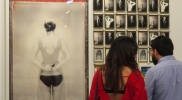|
|
| Favorites: Diaristic Quotes
|
| I’ve been collecting quotes pertaining to diary-keeping for more than half of my adult life, many of which are included in my master’s thesis. Below are some of my favorites . . . with many more to come as I avidly continue my (re)search.
One of my favorite diarists, Fred Bason, when asked why he kept a diary, said there were many answers he could have given. Among them were:
- sheer egoism.
- as a record of my joy in living.
- that there is a very grave waste of good if we don’t preserve experience.
- to aid my memory in my old age so that I can recapture the thrills of long ago.
|
| Click on any of the categories below to go directly to the corresponding diaristic quote:
Diary as Autobiography . Diary as Capital . Diary as Claim to Fame . Diary as Commentator . Diary as Communicator . Diary as Companion . Diary as Composer . Diary as Confidant . Diary as Consoler . Diary as Disciplinarian . Diary as Educator . Diary as Emancipator . Diary as Enlightener . Diary as Entertainment . Diary as Format . Diary as Historian . Diary as Immortalizer . Diary as Literature . Diary as Mass Observation . Diary as Recorder . Diary as Repository/Source Book/Memory Bank . Diary as Second Self . Diary as a Sensual Act . Diary as Sustenance . Diary as Tattler . Diary as Testament . Diary as Therapist . Diary as Time Machine . Diary as Truth
|
|
|
| Diary as Autobiography |
| |
Because the autobiography and the diary have conceptual elements in common—for example, they are both written about the self, by the self—the researcher was able to utilize much of the theorizing on autobiography to comprehend the diary’s theoretical trends. In fact, the researcher’s autobiographical exploration was redeemed with an affluence of diaristic theory, as theorists of autobiography—when explaining why they excluded the diary—were, in effect, defining it. [1]
Patty Martino Alspaugh
[i] Patty Martino Alspaugh, Thesis: Their Use By and Influence on American Newspaper Journalists (CSUN, 2000), 13. |
| “The writer of a memoir or a history knows from the outset where the story is going and how it will end. The diarist doesn’t have a clue what’s around the corner. All one can know about is the past and, with any luck, the onrushing present. That’s a feature of the form, not a bug. What you lose in omniscience and perspective you gain in heedless immediacy and suspense.”
Tina Brown – The Vanity Fair Diaries
|
From the beginning of my career, I kept journals and scrapbooks chronicling what was to be a hilarious, exhilarating, and often infuriating journey across uncharted territory. My intention was to wait until I had achieved a comfortable retirement sometime in the distant future and then write a book for those young women who would and ought to follow. A number of factors accelerated my time schedule, but one of the most important was my discovery that, because I was an unwitting pioneer in my field, I had become a role model. [1]
Jessica Savitch
[1] Jessica Savitch, Anchorwoman (New York: G.P. Putnam’s Sons, 1982), 11.
|
| “…isn’t it absurd to begin a diary a fortnight, perhaps, before death? What does it matter? And by how much are fourteen days less than fourteen years, fourteen centuries?… I had better begin a description of some sort. It’s damp and windy out of doors. I’m forbidden to go out. What can I write about, then? No decent man talks of his maladies; to write a novel is not in my line; reflections on elevated topics are beyond me; descriptions of the life going on around me could not even interest me; while I am weary of doing nothing, and too lazy to read. Ah, I have it, I will write the story of all my life for myself. A first-rate idea! Just before death it is a suitable thing to do, and can be of no harm to any one. I will begin.[1]
Ivan Turgenev
[i] Ivan Turgenev, Diary of a Superfluous Man, trans. by Constance Garnett (London: William Heinemann, 1894, 1899). |
| “I found and reread these diaries [commenced at age 8] about ten years ago. Before I found and reread them, I was proud of what the fact of my rigorous diary keeping predicted about me. I’d been fated to be a writer! I had proof of my doggedness—many volumes of it. I imagined the diaries published at some future date, when my literary fame might bestow upon them an artistic and biographical value. I believed I was born to posthumous greatness. I often imagined myself more famous when dead than when alive. The actual diaries, however, fail to corroborate the myth I’d concocted for myself. They reveal me to possess the mind, not of a future writer, but of a future paranoid tax auditor. I exhibited no imagination, no trace of a style, no wit, no personality. Each entry is an accounting of (or an expressed anxiety about) my school performance.” [June 21, 2012]
Heidi Julavits – The Folded Clock: A Diary
|
| “Is not the poet bound to write his own biography? Is there any other work for him but a good journal? We do not wish to know how his imaginary hero, but how he, the actual hero, lived from day to day.”
Henry David Thoreau
|
| “In the days after Columbine, I filled notebook after notebook with words in an effort to process my confusion and guilt and grief. Like most diaries, mine are unpublishable, but they are invaluable source material for this book [A Mother’s Reckoning: Living in the Aftermath of Tragedy]. People refer to the fog of war, and I am sure something similar applies to my situation If I hadn’t kept a running record of the days, weeks, and years, the fog would have swallowed too much of the story for me to provide a reliable account.”
Sue Klebold
|
| “The Satires of Lucilius were largely autobiographical, and if they had survived intact we should today have as complete a picture of the poet’s life and times as any modern diarist has given of his. Lucilius portrayed not only himself but also his friends and foes, and at the same time discoursed upon the follies and vices of his day, as well as upon philosophy, religion, literature, and grammar; upon travels and adventures; upon eating and drinking, and the many incidents of daily life.” [Introduction]
Horace: Satires, Epistles and Ars Poetica, trans. by H. Ruston Fairclough
|
|
|
|
Diary as Capital
|
| “Every day I receive a letter from a librarian asking if I would not give the originals of the diary and letters to their library. They are not aware that because they did so little to contribute to my reputation as a writer, because they were passive spectators to my difficulties, the diaries are my only capital.”
|
|
|
| Diary as Claim to Fame |
| “There are moments when I have awful misgivings: Is this blessed Journal worthwhile? I really don’t know, and that’s the harassing fact of the matter. If only I were sure of myself, if only I were capable of an impartial view! But I am too fond of myself to be able to see myself objectively. I wish I knew for certain what I am and how much I am worth. There are such possibilities about the situation: it may turn out tremendously, or else explode in a soap bubble. It is the torture of Tantalus to be so uncertain. I should be relieved to know even the worst. I would almost gladly burn my MSS. in the pleasure of having my curiosity satisfied. I go from the nadir of disappointment to the zenith of hope and back several times a week, and all the time I am additionally harassed by the perfect consciousness that it is all petty and pusillanimous to desire to be known and appreciated, that my ambition is a morbid diathesis of the mind. I am not such a fool either as not to see that there is but little satisfaction in posthumous fame, and I am not such a fool as not to realize that all fame is fleeting, and that the whole world itself is passing away.” [September 3, 1916]
W. N. P. Barbellion -The Journal of a Disappointed Man
|
| “…in many cases, more often than we may care to admit… we write for some form of posterity. How many diarists can honestly say they have never once imagined their diaries being ‘discovered,’ either before or after their deaths? Many of us hope we will make good reading. (I occasionally catch myself ‘explaining,’ in my diary: putting in that extra bit of information that I know quite well but cannot expect a stranger to know.)”
Gail Godwin – A Diarist on Diaries (“Antaeus, No. 61”)
|
|
|
| Diary as Commentator |
| |
|
Perception, which is the faculty of detaching the significant from the things observed, is a rare talent. The diarist who possesses it will never fail to keep alert a reader of his record. [1]
Arthur Ponsonby
[1] Arthur Ponsonby, English Diaries: A Review of English Diaries from the Sixteenth to the Twentieth Century (London: Methuen & Co., 1923), 33.
|
|
|
| Diary as Communicator |
| |
This morning I was wondering whether you ever felt like a cow, having to chew my stale news over and over again until you’re so fed up with the monotonous fare that you yawn and secretly wish Anne would dig up something new. [1]
Anne Frank
[1] Anne Frank, The Diary of a Young Girl, The Definitive Edition, ed. by Otto H. Frank and Mirjam Pressler (New York: Anchor Books, 1995), 177.
|
| “To keep a diary is an act of egotism, an announcement that our life is a cabinet of curiosities interesting enough and amusing enough to warrant the attention of readers. Unlike the painter Delacroix (my idea of a great diarist), I did not keep this journal for myself alone, but in hopes of making contact one day with a reader the way an astronomer cocks his great ear at the void, palpitating for the faint electronic evidence that we are not alone in the universe. What is this incessant scribbling if not a hankering for companionship, for that one dearest reader who will give me license without let or hindrance to, as Shakespeare says, ‘unpack my heart with words’?” [Preface]
Richard Selzer – Diary
|
| “I write because I want my parents to understand me. I write to leave something behind for them, for my brother Micah, for my boyfriend Jack, and for my extended family and friends, so I won’t just end up as ashes scattered in the ocean and nothing else.” [June 3, 2017]
Salt In My Soul: An Unfinished Life – Mallory Smith
|
I resolved to write a journal of the time till W. and J. return, and I set about keeping my resolve because I will not quarrel with myself, and because I shall give Wm pleasure by it when he comes home again. [1]
Dorothy Wordsworth
[1] Dorothy Wordsworth, Journals of Dorothy Wordsworth: The Alfoxden Journal 1978; The Grasmere Journals 1800-1803, ed. by Mary Moorman (New York: Oxford University Press, 1971), 15-16.
|
I think that the journal writer, like the poet, is haunted by the ghost of a reader; but a ghost is very different from some palpable flesh-and-blood reader whom the writer imagines lolling over his shoulder with his expectations, standards and demands. I had, indeed, no intention of publishing these journals though hoping, doubtless, that some day after my death, someone would read them and find them interesting. [1]
Stephen Spender
[1] Stephen Spender, Journals, 1939-1983, ed. by John Goldsmith. (New York: Random House, 1986) 14.
|
| “I have all my life regretted that I did not keep a regular Journal. I have myself lost recollection of much that was interesting, and I have deprived my family and the public of some curious information, by not carrying this resolution into effect.”
English Diaries of the XIX Century – Sir Walter Scott
|
| “…for the most part we are, within the limits of our powers of expression, egotists, and our desire is to think and if possible talk and write about this marvelous experiment of ourselves, with all the world—or as much as we can conveniently assemble—for an audience.”
H. G. Wells (Introduction to W. N. P. Barbellion’s The Journal of a Disappointed Man)
|
| “… I am glad I keep Journals—as I have done, on and off, for the past forty years—for they are the best way of bringing to life what it was really like, once, recapturing and recovering the otherwise irrecoverable past.”
Travel Happy (1961) – Oliver Sacks
|
| “We shoot the Rolling Stone cover tomorrow and I want to see what’s around there for the shoot. Since I’ll be doing my best to keep my nose clean on this tour I’ll try to write a lot every day. Someday maybe I’ll have kids, and they can read these diaries… or no, maybe not.” [June 16, 1987]
The Heroin Diaries: A Year In The Life Of A Rock Star – Nikki Sixx
|
|
|
| Diary as Companion |
| |
“Dear Diary, I wish you were an animate object so you would know how much enjoyment you give me.”
Patty Martino Alspaugh
|
“To enhance the image of this long-awaited friend in my imagination,” writes Anne Frank, “I’m going to call this friend Kitty.”[1]
Anne Frank
[1] Anne Frank, The Diary of a Young Girl, The Definitive Edition, ed. by Otto H. Frank and Mirjam Pressler (New York: Anchor Books, 1995), 7.
|
| “… these notebooks despite their attempt at merciless candor about my life fall short, give very little, perhaps really distort unfavorably for I seem inclined to note only the seedier things. Still they are companionable things. They talk to me from the past in a comforting way, make the links more real. The past gets lost so sadly. This will be the past, but what will the future be? I have never found it less conceivable.”
Tennessee Williams
_______________________________
[i] Tennessee Williams, Notebooks: Tennessee Williams, ed. by Margaret Bradham Thornton (New Haven: Yale University Press, 2006), 397. |
| “Every true diarist knows that having a relationship with a diary is like having a relationship with anyone else: the longer it lasts, the more it is bound to change.”
A Diarist on Diaries (“Antaeus, No. 61”) – Gail Godwin
|
|
|
| Diary a Composer |
| |
“Early in life at the age of 15, I had commenced the dangerous habit of keeping a journal and this I maintained for 10 years. The volumes remained in my possession unregarded—never looked at until 1870, when I examined them and with many blushes destroyed them. They convicted me of folly, ignorance, indiscretion, idleness, extravagance, and conceit. But they had habituated me to the rapid use of pen and ink, and taught me how to express myself with facility.”
Autobiography of Anthony Trollope – Anthony Trollope
|
“. . . diary writing has greatly helped my style; loosened the ligatures.” [1]
Virginia Woolf
[1] Virginia Woolf, A Writer’s Diary, ed. by Leonard Woolf (New York: Harcourt Brace Jovanich, 1981), 67.
|
| “When I began this diary my idea was that it would be a way of ‘spying on myself from close up,’ in the words of Michel de Montaigne, I had meant for this diary to reveal the real Richard Selzer, a simple, ordinary man with the habit of writing down whatever he thought or did. Unlike my stories and essays, there would be no straining for effect. It would be free of the pomp of language and the vanity of the author. Simple, unadorned prose would be best. But almost immediately, I came face to face with the difficulty, if not the impossibility, of presenting myself to the public in a candid, orderly way without dressing up for the occasion. It was necessary that I make use of art and artifice, including metaphor, symbol, allusion, onomotopoiea, irony, and all the ‘airy medium of words’ that make up the storyteller’s instrument. In other words, I could not be other than what I am. My imagination is an especially demanding one; I have the duty and the desire to placate it.” [Preface]
Richard Selzer – Diary
|
| “A woman on All Things Considered wrote a book of advice called If You Want to Write and mentioned the importance of keeping a diary. It was valuable, she said, because after a while you’d stop being forced and pretentious and become honest and unafraid of your thoughts.” [July 1, 1983]
Theft by Finding: Diaries (1977-2002) – David Sedaris
|
|
|
| Diary as Confidant |
| |
“If I couldn’t confide in them [diaries], I risked losing track of myself.” [i]
Gail Godwin
[i] Gail Godwin, The Making of a Writer, Volume 2 (New York: Random House, 2011), 167.
|
“Diary, Diary,
you’re so dear,
always here
to lend an ear.”
Patty Martino Alspaugh
|
“I regret nothing. I only regret that everybody wants to deprive me of the journal, which is the only steadfast friend I have, the only one which makes my life bearable; because my happiness with human beings is so precarious, my confiding moods so rare, and the least sign of non-interest is enough to silence me.” [1]
Anaïs Nin
[1] Anaïs Nin, The Diary of Anaïs Nin, 1931-1934, ed. by Gunther Stuhlmann (New York: The Swallow Press and Harcourt, Brace & World, 1966), 224.
|
“To Nobody, then will I write my Journal! Since to Nobody can I be wholly unreserved” [1]
Fanny Burney
[1] Robert A. Fothergill, Private Chronicles: A Study of English Diaries (New York: Oxford University Press, 1974), 88.
|
| “Soon after I began to write poetry, I began to keep a sort of notebook-journal, in which I recorded, for whatever lost reasons—loneliness, perhaps, or shyness; the not wanting to expose my innocence and ignorance to anyone else—my observations, thoughts, frustrations, and—mostly—false-alarm intuitions about what I was trying to do at the time. The frequency of the entries seems to be in inverse proportion to the amount of actual poetry writing I was doing at a given time.”
Antaeus No. 61 – C.K. Williams
|
| “Why have I not kept a journal in so long? Perhaps it is because I’ve been less lonely, or perhaps only that I grew tired of talking to myself about myself, which is what my journals were mostly. However it is good to keep one. Serves some excellent purposes. I hope I will continue this one.”
Tennessee Williams
_______________________________
[i] Tennessee Williams, Notebooks: Tennessee Williams, ed. by Margaret Bradham Thornton (New Haven: Yale University Press, 2006), 499. |
| “To keep a journal is to have a secret liaison of a very sentimental kind. A journal intime is a super-confidante to whom everything is told and confessed. For an engaged or married man to have a secret super-confidante who knows things which are concealed from his lady seems to me to be deliberate infidelity. I am as it were engaged to two women and one of them is being deceived. The word ‘Deceit’ comes up against me in this double life I lead, and insists I shall name a plain thing bluntly. There is something very like sheer moral obliquity in these entries behind her back… Is this journal habit slowly corrupting my character? Can an engaged or married man conscientiously continue to write his journal intime?” [August 6, 1915]
The Journal of a Disappointed Man – W. N. P. Barbellion
|
| “I had also told Bogner about the problem with the diary. I have to make a will. If I died today the diary would cause a catastrophe. The vaults and storages would ultimately open and they would be sent to the nearest of kin: Hugo. I have no one else I can trust. Jim Herlihy wants to take charge. He is devoted to me and to the diary, and he is my spiritual son, but he is too young and not objective, and he does not love Hugo.” [New York, January 11, 1955]
Trapeze: The Unexpurgated Diary of Anaïs Nin, 1947-1955 – edited by Paul Herron
|
| “Returned home with Hugo to find a sneak thief had broken open one of the locked tins in which I kept carbons of the diaries. If Hugo had come before me he would have seen it all, and it would have meant a disaster worse than death.”[May 19, 1944]
Mirages: The Unexpurgated Diary of Anaïs Nin, 1939-1947, edited by Paul Herron
|
|
|
| Diary as Consoler |
| |
“What a consolation it is to write this! I am already calmer. Not only do the annoyances I suffer injure my heath, but they injure my disposition and my appearance.” [1]
Marie Bashkirtseff
[1] Marie Bashkirtseff, The Journal of a Young Artist 1860-1884, trans. by Mary J. Serrano (New York: E.P. Dutton & Company, 1919), 10.
|
| “Hulloa, old friend: how are you? I mean my Diary. I haven’t written to you for ever so long, and my silence as usual indicates happiness.” [May 5, 1916]
The Journal of a Disappointed Man – W. N. P. Barbellion
|
|
Up, after sleeping very well; and so to my office, setting down the journall of this last three days. And so settled to business again—I hope with greater chearefullnesse and successe by this refreshment. [1]
Samuel Pepys
[1] Samuel Pepys, The Illustrated Pepys: Extracts from the Diary, ed. by Robert Latham (Los Angeles: University of California Press, 1978), 56.
|
“Melancholy diminishes as I write [in diary].”[1]
Virginia Woolf
[1] Virginia Woolf, A Writer’s Diary, ed. by Leonard Woolf (New York: Harcourt Brace Jovanich, 1981), 28.
|
| “I fall back on this Journal just as some other poor devil takes to drink. I, too, have toyed with the idea of drinking hard. I have frequented bars and billiard saloons and in fits of depression done my best to forget myself. But I am not sufficiently fond of alcohol (and it would take a lot to make me forget myself). So I plunge into these literary excesses and drown my sorrows in Stephens Blue-black ink.”
The Journal of a Disappointed Man – W. N. P. Barbellion
|
| “Sometimes I cry, sometimes I watch TV, sometimes I write in this journal. But I feel like that solidifies this narrative—that I’m anxious and struggling and miserable. When really, that’s NOT true most of the time these days; it’s just that the times when it is true have a disproportionate impact on my perception of my life experience. And that’s when I feel like writing.”
Mallory Smith – Salt In My Soul: An Unfinished Life
|
| “The snarls of our relationship have been miraculously ironed out in my mind by my personal perusal of my diaries… The vicissitudes through which Wilder and I have been together struck me forcibly and made other things negligible.” [June 15, 1943]
Charles Brackett
|
| “In the first days after Columbine, I turned again to writing as an outlet, in a journal Dylan had given me for Christmas… the relief I got from writing felt almost physical, if temporary. My diaries became the place for me to corral the myriad, often-contradictory feelings I had about my son and what he had done. In the earliest days, writing allowed me to process my tremendous grief for the sorrow and suffering Dylan had caused. Before I could reach out personally to the families of the victims, the journals were a place for me to apologize to them with all my heart, and to grieve privately for the losses they had sustained… Writing in my diary also allowed me the space to reflect on my own loss when I did not feel safe enough to speak about it openly. Our lawyer had told me I could not attend a support group without putting the other members at risk of being deposed, but I needed a safe space to remember and eulogize my son. To the rest of the world, Dylan was a monster; but I had lost my child.”
Sue Klebold – A Mother’s Reckoning: Living in the Aftermath of Tragedy
|
| “When George Sand was normal she did her work. Whenever she lost her poise she wrote a journal. This manifestation of pent-up feeling seeking relief repeated itself several times in her life. Occasionally, as substitute for self-communion, the outlet was a long confidential letter to a friend. In either case the psychology was the same. When her emotions upset her life she got rid of them in writing, and these outpourings testify how much inner rebellion the tremendous personality which was George Sand had to contend with, in order to do a man’s work in the world.”
Marie Jenney Howe (ed. & trans.) – The Intimate Journal of George Sand
|
|
|
| Diary as Disciplinarian |
| |
“Bless me diary, for I have sinned, it has been a week since my last confession.” [i]
Patty Martino Alspaugh
[i] Patty Martino Alspaugh, Thesis: Their Use By and Influence on American Newspaper Journalists (CSUN, 2000), 9.
|
“Don’t be angry that I have been absent so long without writing, for I have been so entirely without a moment to myself, except for dressing, that I really have not had it in my power.” [1]
Frances Burney
[1] Frances Burney, The Diary and Letters of Frances Burney, Madame D’Arblay, vol. 1, ed. by Sarah Chauncey Woolsey (Boston: Roberts Brothers, 1890), 92.
|
“As a matter of routine, I should force myself to write a few lines here every day.” [1]
André Gide
[1] André Gide, The Journals of André Gide, vol. 1, trans. by Justin O’Brien (New York: Alfred A. Knopf, 1955), 12.
|
|
|
|
Diary as Educator
|
| “A person writing a journal must be constantly aware not only of what she is experiencing but also of all sorts of ‘little things,’ the light on a wall as it moves, a bird at the feeder, the haunting face on the subway. People who keep journals these days, from those I have seen, do not notice very much outside themselves. Endless self-analysis is boring. The journal as merely ‘confessional’ is boring. It has to transcend the self here and there. And it must place before the reader concrete images as well as ideas and feelings.”
Ariadne’s Thread Introduction – Lyn Lifshin, ed.
|
| “I need to write a diary, just as I need to write fiction, but the two needs come from very different sources. I write fiction because I need to organize the clutter of too many details into some meaning, because I enjoy turning something promising into something marvelous; I keep a diary because it keeps my mind fresh and open. Once the details of being me are safely stored away every night, I can get on with what isn’t just me. So, as I explained to my friend, the fictional and the diary-making processes are not interchangeable. I had to keep a diary for many years before I could begin writing fiction.”
A Diarist on Diaries (“Antaeus, No. 61”) – Gail Godwin
|
|
|
| Diary as Emancipator |
| |
“Suddenly today the most amazing idea struck me! This morning I was thinking that for exactly twenty years I’ve been writing steadily, at short stories and novels. In those thousands and thousands of words, I’ve been speaking for somebody else. Just for once I want to be me. I want to stop agonizing over imaginary women’s emotions and reactions and think about my own. In short, I’m going to keep a Diary. Without benefit of style as such, without fear of publisher, editor, or critic, I shall write exactly as I please. If I care to split an infinitive I shall split it even if the crack can be heard a mile away.” [1]
Agnes Sligh Turnbull
[1] Agnes Sligh Turnbull, Dear Me: Leaves from the Diary of Agnes Sligh Turnbull (New York: The Macmillan Company, 1941), 1-2.
|
| “I knew I was one of the first women ever in the penal system to get such a position [guard], so I decided to keep a diary on my experiences on the job. Before this I had not kept a diary since I was twelve years old… I would jot down bits and pieces as they happened at work, write up the day when I got home if I had the energy.”
Sharon Wysocki – Ariadne’s Thread
|
“To be fully satisfying this should be a place where one says something . . . about how the inner man feels, thinks, dreams, believes, at the time, without worrying one bit whether it will sound silly to me if read a year or ten or twenty years later.” [1]
David E. Lilienthal
[1] David E. Lilienthal, The Journals of David E. Lilienthal, vol. v (New York: Harper & Row, 1971), 44.
|
“Is the diarist truthful in his or her writings, and does it matter? Like a doctor’s patient etherized upon the table, the diary is under the total control of the diarist. It is the diarist’s histrionic stage—whether it is a tragic or comic portrayal, a subtle Stanislavskyian execution or an overly-dramatic silent film performance, truthful or deceitful. Diarists, as contrasted with autobiographers, write specifically for, and to, themselves. Therefore, any apocrypha is only a form of hara-kiri welded against the diarist’s own sense of self-understanding and growth.” [i]
Patty Martino Alspaugh
[i] Patty Martino Alspaugh, Thesis: Their Use By and Influence on American Newspaper Journalists (CSUN, 2000), 9.
|
| “What would H. [Joy Davidman, wife] herself think of this terrible little notebook to which I come back and back? Are these jottings morbid?… Part of every misery is, so to speak, the misery’s shadow or reflection: the fact that you don’t merely suffer but have to keep on thinking about the fact that you suffer. I not only live each endless day in grief, but live each day thinking about living each day in grief. Do these notes merely aggravate that side of it? Merely confirm the monotonous, tread-mill march of the mind round one subject. But what am I to do? I must have some drug, and reading isn’t a strong enough drug now. By writing it all down (all?—no: one thought in a hundred) I believe I get a little outside it.”
C.S. Lewis – A Grief Observed
|
| “The inspiration for this book appeared a few days after I was diagnosed with Alzheimer’s [57 years old]… It is my intention to stay in the open with no secrets. I will hide nothing, not even the inevitable self-absorption typical of such a disease. To retreat from my lonely internal immersion with myself and the disease, I started a diary, that has become this book, as unique perhaps as the disease itself.”
Thomas DeBaggio – Losing My Mind: An Intimate Look at Life with Alzheimer’s
|
|
|
| Diary as Enlightener |
| |
I wish to set down such choice experiences that my own writings may inspire me . . . I am greedy of occasions to express myself. [1]
Henry David Thoreau
[1] Henry David Thoreau, The Journal of Henry David Thoreau, vol. 1: 1837-1846, ed. by Torrey Bradford and Francis H. Allen (Salt Lake City: Gibbs M. Smith, 1984), 1xiii.
|
“The diarist refuses to accept things at face value, but goes on burrowing and questioning indefatigably.”
Journals of John Fowles
|
| “What good is experiencing anything if it’s not reflected on, digested and interpreted.”
Erika Hoffman – Bylines 2010 Writer’s Desk Calendar
|
| “A journal to be good, true, and interesting, should be written without the slightest reference to publication, but without any fear of it; it should be the transcript of a mind which can bear transcribing… The habit of recording is first of all likely to generate a desire to have something of some interest to record; it will lead to habits of reflection and to trains of thought, the pursuit of which may be pleasing and profitable; it will exercise the memory and sharpen the understanding generally; and though the thoughts may not be profound, nor the remarks very lively or ingenious, nor the narrative of exceeding interest, still the exercise is, I think, calculated to make the writer wiser and perhaps better.”[i]
Charles Cavendish Fulke Greville
__________________________________________________
[i] Charles Cavendish Fulke Greville, Leaves From the Greville Diary, (New York: E.P. Dutton & Company, n.d.), 333-34. |
“I love this process by which each passing day is captured, not only its impressions, but also, at least by suggestion, its intellectual direction and content as well, less for the purpose of rereading and remembering than for taking stock, reviewing, maintaining awareness, achieving perspective.” [1]
Thomas Mann
[1] Thomas Mann, Thomas Mann Diaries, 1918-1939, trans. by Richard and Clara Winston (New York: Harry N. Abrams, Inc., 1982), 194.
|
“Zen Buddhists spend untold hours every day pondering life, hoping to attain the peak moment of spiritual enlightenment called satori. Diarists enact the same sort of self-exploration by writing in their diaries. By writing daily about one’s experiences, one cannot help but open an inner valve of consciousness.” [i]
Patty Martino Alspaugh
[i] Patty Martino Alspaugh, Thesis: Their Use By and Influence on American Newspaper Journalists (CSUN, 2000), 9.
|
“André Gide says his diary is most valuable when it records the awakening of ideas.” [1]
André Gide
[1] André Gide, The Journals of André Gide, vol. 1, trans. by Justin O’Brien (New York: Alfred A. Knopf, 1955), 15.
|
“David Lilienthal says that out of his diary “come some of the most satisfying experiences of life, for me: finding expression, somehow, for the things that are inside me that I believe and want others to believe.”[1]
David E. Lilienthal
[1] David E. Lilienthal, The Journals of David E. Lilienthal, vol. v (New York: Harper & Row, 1971), 21.
|
| “The best thing would be to write down events from day to day. Keep a diary to see clearly—let none of the nuances or small happenings escape even though they might seem to mean nothing. And above all, classify them. I must tell how I see this table, this street, the people, my packet of tobacco, since those are the things which have changed. I must determine the exact extent and nature of this change . . . I must always be ready, otherwise it will slip through my fingers. I must carefully note and detail all that happens.”
Nausea – Jean-Paul Sartre
|
| “I have found so many sides of myself in the diaries of others. I would like it if I someday reflect future readers to themselves, provide them with examples, warnings, courage, and amusement.”
A Diarist on Diaries (“Antaeus, No. 61”) – Gail Godwin
|
| “It was while writing a Diary that I discovered how to capture the living moments.”
Anaïs Nin
|
|
|
| Diary as Entertainment |
| “I have determined to grant a new charter to my pen having finished my commonplace book, which I commenced in January, and with as much success as I was ambitious of—whose whole aim was the small utility of being the exchequer to the accumulating store of organized verbs, nouns and substantives, to wit, sentences. It has been a source of entertainment, and accomplished its end, and on this account has induced me to repeat or rather continue the experiment. Wherefore, On!”
The Heart of Emerson’s Journals – edited by Bliss Perry
|
|
|
|
Diary as Format
|
| “This diary looked so inviting when I first bought it, just like all the enticing ‘Blue Horse’ notebooks I hoarded in Carolina. And then left unfilled though I sniffed them a lot. The smell of books and paper used to be so wonderful. But this isn’t big enough, for one thing; I feel limited by the short page. And it doesn’t open up, bend nicely, invite me to write, like the first hole of a good golf course should invite you to play. It looks official, though, it demands I mention the day. If I used my old Blue Horse, I probably wouldn’t start at all. [January 1, 1978 – Vermont]
Susan Kinnicutt – Ariadne’s Thread
|
| “… in the Diary I only wrote of what interested me genuinely, what I felt most strongly at the moment, and I found this fervor, this enthusiasm produced a vividness which often withered in the formal work. Improvisation, free association, obedience to mood, impulse, bought forth countless images, portraits, descriptions, impressionistic sketches, symphonic experiments, from which I could dip at any time for material.”
Anaïs Nin
|
| “. . . writing a journal implies that one has ceased to think of the future adn has decided to live wholly in the present. It is an announcement to fate that you expect nothing more. It is an assertion that you take each day as it comes and make no connection between to-day and other days. Writing a journal means that facing your ocean you are afraid to swim across it, so you attempt to drink it drop by drop. It means that you count the last leaves of a tree whose trunk has lost its sap.”
The Intimate Journal of George Sand – ed. & trans. by Marie Jenney Howe
|
| “. . . I note however that this diary writing does not count as writing, since I have just re-read my year’s diary and am much struck by the rapid haphazard gallop at which it swings along, sometimes indeed jerking almost intolerably over the cobbles. Still if it were not written rather faster than the fastest type-writing, if I stopped and took thought, it would never be written at all; and the advantage of the method is that it sweeps up accidentally several stray matters which I should exclude if I hesitated, but which are the diamonds of the dustheap.”
Virginia Woolf – A Writer’s Diary
|
|
|
| Diary as Historian |
“It is important to understand the diary’s role in a journalist’s life because it provides insight into one of the most formidable influences on society today: the media. And who better than a journalist to clothe the bare facts of history with the silken robes of perspicacity.” [i]
Patty Martino Alspaugh
[i] Patty Martino Alspaugh, Thesis: Their Use By and Influence on American Newspaper Journalists (CSUN, 2000), 12. |
| “Read Henry’s journal of past days. How I wish I had the record of every hour of his dear life. I am thankful to glean any part of it that was lost to me…. It is intensely, painfully interesting to me to see how his great heart rode over the billows of every cruel experience….”[i]
Fanny Appleton Longfellow
______________________________
[i] Fanny Appleton Longfellow, Mrs. Longfellow: Selected Letters and Journals: 1817-1861, ed. by Edward Wagenknecht (New York: Longmans, Green and Co., 1956), 104-05. |
|
Diary writing is a practice that should be encouraged. . . . Notwithstanding all the immense store of facts we are compiling by means of newspapers, books, registers and official records with regard to the history of our times, the privately written comments of an individual spontaneously scribbled and so reproducing the mood, the atmosphere, and, so to speak, the particular aroma of the moment, are priceless and can be regarded as the spice of history. [1]
Arthur Ponsonby
[1] Arthur Ponsonby, English Diaries: A Review of English Diaries from the Sixteenth to the Twentieth Century (London: Methuen & Co., 1923), 43.
|
A diary is not about the past; it’s about the present, a record of precisely what you are getting through or over, trying to savor or avoid, at the very moment you are doing it. If memory stores the spirit of our existence, then a diary in its bona fide physical existence, surely retains the flesh and blood.
Miss American Pie – Margaret Sartor
|
| “Most of the diaries chosen for this book are in The Bancroft Library at the University of California at Berkeley, where I work, trolling the ranks and ranges of collections. In acid-free boxes, arranged on shelves in temperature-controlled darkness, they have come as donations, tag-alongs, bequests, purchases, or hotly contested auction lots. They have been selected by librarians to fill in the chinks in the house of history, to put a name and face to a time and place, to supply humor, pathos, grime, existential angst, and vision to the entirely of the human record.”
Beyond Words: 200 Years of Illustrated Diaries – Susan Snyder
|
| “Am taking up my diary today aware of its importance and necessity. We can no longer be in doubt we’re on the brink of momentous and, in all probability, dire events. The word ‘war’ hangs in the air… The world may well be on the edge of a general conflict between communism and fascism. If events unfold, the first thing that will happen will be war between the Bolsheviks and Poland. From now on I will start keeping a precise record of events.” [October 18, 1923]
Mikhail Bulgakov: Diaries sand Selected Letters
|
| “This is the fourth—and the last—empty M.S. book I can find in the house…I resolve to limit my jottings. I will not start buying books for the purpose. In so far as this record was a defence against total collapse, a safety-valve, it has done some good. The other end I had in view turns out to have been based on a misunderstanding. I thought I could describe a state; make a map of sorrow. Sorrow, however, turns out to be not a state but a process. It needs not a map but a history, and if I don’t stop writing that history at some quite arbitrary point, there’s no reason why I should ever stop. There is something new to be chronicled every day. Grief is like a long valley, a winding valley where any bend may reveal a totally new landscape.”
C.S. Lewis – A Grief Observed
|
|
|
| Diary as Immortalizer |
| |
What if I should happen to die suddenly! My family would find my journal, and destroy it after having read it, and soon nothing would be left of me—nothing—nothing—nothing! To live, to have so much ambition, to suffer, to weep, to struggle, and in the end to be forgotten;—as if I had never existed. [1]
Marie Bashkirtseff
[1] Marie Bashkirtseff, The Journal of a Young Artist, 1860-1884, trans. by Mary J. Serrano (New York: E. P. Dutton & Company, 1919), xiv.
|
| “But for my pen, all the adventures of this noble family might sink into oblivion! I am amazed when I consider the greatness of my importance, the dignity of my task, and the novelty of my position.”
The Pleasures of Diaries – Fanny Burney
|
| “If only I could rest assured that after I am dead these Journals will be tenderly cared for—as tenderly as this blessed infant! It would be cruel if even after I have paid the last penalty, my efforts and sufferings should continue to remain unknown or disregarded. What I would give to know the effect I shall produce when published! I am tortured by two doubts—whether these MSS. (the labour and hope of many years) will survive accidental loss and whether they really are of any value. I have no faith in either.” [November 12, 1916]
The Journal of a Disappointed Man – W. N. P. Barbellion
|
|
|
| Diary as Literature |
| |
|
My journal is that of me which would else spill over and run to waste. [1]
Henry David Thoreau
[1] Henry David Thoreau, The Journal of Henry David Thoreau, Volume I: 1837-1846, ed. by Torrey Bradford and Francis H. Allen (Salt Lake City: Gibbs M. Smith, 1984), 206.
|
|
Once a writer, like an actor, is audience-oriented, such considerations as telling a good story, getting the sounds and rhythm right, supplying sufficient detail for another’s understanding, can never be excluded.
Deborah Martinson
|
|
“Am busy re-writing, editing and bowdlerising my journals for publication against the time when I shall have gone the way of all flesh. No one else would prepare it for publication if I don’t. Reading it through again, I see what a remarkable book I have written. If only they will publish it.” [February 6, 1917]
The Journal of a Disappointed Man – W. N. P. Barbellion
|
|
“I’ve spent the last few hours rereading the Journal and find it less exciting than I thought, and quite unpublishable in its present form…But there is a lot in it. I have to develop it.” [February 2, 1955]
Norman Mailer
|
|
“I can’t say for sure whether there’s a difference in my journal writing style and my essay-novel-story writing style. I would suspect they all have in common a preoccupation with form, but there’s probably more slang and profanity and recklessness in the journals. Sometimes I am delighted with the bursts of wild candor and arrogance in my journals and I try to incorporate them in my public writing when I can. These selections show patterns in my writing life, pattterns I might not have perceived if I hadn’t kept journals.”
Gail Godwin – Ariadne’s Thread
|
|
“The diary as a project. The diary covers the period between 1914 to the present, and the setting moves between Europe and America. It is immensely rich in activities, voyages, relationships, and it encompasses all classes of people and nationalities. It was not written for publication and heretofore the quality of complete truth is developed strongly, revealing more than the usual novel does about character and events. It is the diary I wish to convert into a long novel. From it I have already transposed one novel, Winter of Artifice, and short stories, Under a Glass Bell. [September 14, 1944]
Mirages: The Unexpurgated Diary of Anaïs Nin, 1939-1947, edited by Paul Herron
|
|
“. . . [Sylvia] Plath wrote about herself and the people she knew as if they were characters in a novel. The journals are a kind of furiously written first draft of a bildungsroman into which the writer pours everything, knowing there will be time later on to revise and cut and shape and order. Plath writes about people with a novelist’s noticing eye, and the journals’ atmosphere of intrusive intimacy derives from this.”
Janet Malcolm – The Silent Woman: Sylvia Plath & Ted Hughes
|
|
|
| Diary as Mass Observation |
| |
|
“The diary [Ian Breakwell’s Diary 1964-1985] can be seen as a latterday extension of the work of Mass Observation, that collection of artist-anthropologists who set out in the late 1930’s to document a ‘real’ Britain by observing such ‘mass’ phenomena as ‘Behaviour of people at war memorials, shouts and gestures of motorists, funerals and undertakers, the private lives of midwives,’ etc. Mass Observation was the brainchild of three men, Charles Madge, Tom Harrisson and Humphrey Jennings, whose origins were a long way from the masses of ‘Worktown’ which they set out to document. The project ran the risk of paternalism, but yielded vast quantities of fascinating material providing insights which, like a jigsaw, became a portrait of the time… Breakwell is a modern mass observer, though less distanced from the observed ‘subjects.’ He too sees a potential for both therapy and transformation in the smallest details. The very act of observing and recording reveals a significance all too easily glossed over.”
Nick Kimberley (Introduction to Ian Breakwell’s Diary 1964-1985)
|
| “Sarah Knight had rather casually departed from Boston by horse on a journey to New Haven—and in so doing entered irrevocably into American history. Following roughly the route of the present main-line Pennsylvania Railroad trains and keeping a journal of her travels… the redoubtable lady from Boston revealed herself as an extraordinary diarist—keenly and wittily observant, possessed of a sharp eye for local color and a sure ear for the words of others (particularly her inferiors), gently self-mocking, and quite without pretense or guile.”
Malcolm Freiberg (The Journal of Madame Knight – Sarah Kemble Knight)
|
|
|
| Diary as Recorder |
| |
|
I might render a service to posterity by recording, not so much Lyova’s [Leo’s] everyday life, as his mental activities, so far as I was able to watch them. [1]
Sophie Tolstoy
[1] Sophie Andreyevna Tolstoy, The Diary of Tolstoy’s Wife, trans. by Alexander Werth (London: Victor Gollancz, 1928), 53.
|
| “Why do I keep this voluminous journal? I can hardly tell. Partly because life appears to me such a curious and wonderful thing that it almost seems a pity that even such a humble and uneventful life as mine should pass altogether away without some such record as this and partly because I think the record may amuse and interest some who come after me.”
The Pleasures of Diaries – Francis Kilvert
|
I reread this notebook January 10, 1806 at Marseille; it seems to have filled its purpose well enough. At times, there are some moments of profundity in the portrayal of my character. [1]
Stendhal
[1] Marie-Henri Beyle, The Private Diaries of Stendhal (Marie-Henri Beyle), ed. and trans. by Robert Sage (London: Victor Gollancz, 1955), 68.
|
| “If it’s a full page, it’s a full day [diary].”
Patty Martino Alspaugh
|
| “Whenever I get a good idea, I write it down in my diary before it goes out of my head.”
Chicago – Roxie Hart (Renée Zellweger)
|
| “What I prefer recording at the end—or, more recently, at the start—of my day are remarkable events I have observed (fistfights, accidents, a shopper arriving with a full cart of groceries in the express lane), bits of overheard conversation, and startling things people have told me… then there are the jokes I’ve heard at parties and book signings over the years… It might look like my average diary entry amounts to no more than seven sentences, but in fact I spend an inordinate amount of time writing about my day—around forty-five minutes, usually. If nothing big happened, I’ll reflect on a newspaper article or a report I heard on the radio. I’m not big on weather writing but have no policy against it.”
[Introduction] Theft by Finding: Diaries (1977-2002) – David Sedaris
|
“Some things are better left unread.”
Patty Martino Alspaugh
|
| “These pages are intended at their commencement to contain a record of new thoughts (when they occur); for a receptacle of all the old ideas that partial but peculiar peepings at antiquity can furnish or furbish; for tablet to save the wear and tear of weak Memory, and, in short, for all the various purposes and utility, real or imaginary, which are usually comprehended under that comprehensive title Common Place Book.”
The Heart of Emerson’s Journals – edited by Bliss Perry
|
| “A diary is recorded experience.”
Journals of John Fowles – John Fowles
|
| “…The concept of a reporter’s stories serving as his or her diary is an interesting one that accentuated the similarity between the journalist and the diarist. Both report regularly on what they see and experience and both work as gatekeepers to what information is recorded. The diarist, however, is not confined by an editor’s blue pencil or by a reader’s censure…”
2000 Thesis Abstract – Patty Martino Alspaugh
|
| “…reverie turns upon itself as dreams do; that impressions added together do not always produce a fair judgment; that a private journal is like a good king, and permits repetitions, outpourings, complaints… These unseen effusions are the conversation of thought with itself, the arpeggios, involuntary but not unconscious, of that Aeolian harp we bear within us. Its vibrations compose no piece, exhaust no theme, achieve no melody, carry out no programme, but they express the innermost life of man.”
Amiel’s Journal – Henri-Frederic Amiel
|
…therein lies their [diaries] value for me today. It is impossible to gloss over or misremember what is recorded in your own handwriting of forty years before. [i]
Gail Godwin
[i] Gail Godwin, The Making of a Writer, Volume 2 (New York: Random House, 2011), 167.
|
| “The most intimate and extensive journal can only give each day a relatively small sifting of the almost infinite number of things that flow thro’ the consciousness. However vigilant and artful a diarist may be, plenty of things escape him and in any event re-collection is not re-creation.” [August 6, 1915]
The Journal of a Disappointed Man – W.N. P. Barbellion
|
|
I have all my life regretted that I did not keep a regular journal. I have myself lost recollection of much that was interesting and I have deprived my family and the public of some curious information by not carrying this resolution into effect.
Sir Walter Scott
|
|
“I am most happy. Happy Birthday. 35 years faithfull to my diaries. It’s a pretty good record. And it doesn’t matter to me if the world never sees this. What really matters is that I’ve been true to myself and kept my word to myself. And I will end today’s diary with a slogan. Play and be happy, then go back to work and be happy. Because you can’t be happy for long without work.” [i]
Fred Bason
________________________________
[i] Fred Bason, The Last Bassoon, ed. by Noel Coward (London: Max Parrish, 1960), 33. |
|
“Does disliking or distrusting a journal mean I dislike/distrust myself: I don’t know. Don’t think so. Life moves too rapidly now, is filled w/ too much excitement & pleasure, to be typed out in this form. I think that’s it. Yet as it slips away I feel a distinct regret, a fear of loss for I’ll forget everything that isn’t somehow recorded. & there is so much of sheer simple happiness these days/domestically I mean/ & w/ friends—I wish I might preserve forever.” [January 4, 1985]
Selections from a Journal: January 1985—January 1988 – Joyce Carol Oates
|
|
“Until 2013, seventeen leather-bound diaries lived in a wicker laundry basket at Astrid Lindgren’s (author of Pippi Longstocking books] familial home address, 46 Dalagatan in Stockholm. The diaries cover the years 1939-45. Her own name for them was ‘The War Diaries’ and they are now accessible to the public for the first time. The diaries bulged with press cuttings, pasted in between Lindgren’s handwritten entries. She refers now and then to the time it has taken her to save newspapers and magazines, sift through them and select items to cut out for pasting into her notebooks, but it was a task she set herself and she carried it through to the end, the number of cuttings increasing with every passing wartime year.”
Introduction to Astrid Lindgren’s War Diaries, 1939-1945, Sarah Death (trans.)
|
|
“Little one: This journal will be a record of my askings; a record of our beginnings; a record of our awakening; a record of the fact that before you, there was me. Who in the middle of my life—in chaos—choose you.” [May 1, 1977]
With Child: A Diary of Motherhood – Phyllis Chesler
|
| “Today I say a final farewell to this little book which is the only record I have made of my personal life for sixteen years and more. I have often been helped by looking back in it to compare former with actual states of despondency from bad health or other apparent causes. In this way a past despondency has turned to present hopefulness. But of course as the years advance there is a new rational ground for the expectation that my life may become less fruitful. The difficulty is, to decide how far resolution should set in the direction of activity rather than in the acceptance of a more negative state. Many conceptions of works to be carried out present themselves, but confidence in my own fitness to complete them worthily is all the more wanting because it is reasonable to argue that I must have already done my best. In fact, my mind is embarrassed by the number and wide variety of subjects that attract me and the enlarging vista that each brings with it.
“I shall record no more in this book, because I am going to keep a more business-like diary. Here ends 1877. [Dec. 31, 1877]
The Journals of George Eliot, ed. by Margaret Harris and Judith Johnston
|
| “I’ve been basically the same person since I had my son… I’ve emerged from a gauntlet, and it has something to do with having become a mother, and it has something to do with having become qualitatively old, and it has something to do with having run out of time and life to perceive and ruminate and record my minutes and days in the diary…
“What I’m saying is that I have become, in a way inured to the passage of time. I’m not really paying attention to what’s happening to me anymore—no longer observing steadfastly the things that have changed since yesterday.”
Ongoingness: The End of a Diary – Sarah Manguso
|
|
|
| Diary as Repository/Source Book/Memory Bank |
| “As for memory, I don’t complain of the lack of it or use my diary to improve it, as Mr. S would have me do. It is rather that I know one of us has it—my diary or me—and so, if I can’t remember something, I look it up.”
Gail Godwin – A Diarist on Diaries (“Antaeus, No. 61”)
|
| “There is so much out in the world to see and think about. I used to keep all my thoughts in my head, but eventually there was simply too much to keep it all straight, which is why I started this journal.” [September 1, 2008]
Mallory Smith – Salt In My Soul: An Unfinished Life
|
| “This Book is my Savings Bank. I grow richer because I have somewhere to deposit my earnings; and fractions are worth more to me because corresponding fractions are waiting here that shall be made integers by their addition.”[i]
Ralph Waldo Emerson
_______________________________________________
[i] Ralph Waldo Emerson, The Heart of Emerson’s Journals, ed. by Bliss Perry (New York: Houghton Mifflin Company, 1926), 82. |
| “I originally felt that keeping a journal was so personal, was such an inner dialogue, that it was not meant to be shared. It was a psychic ‘note-taking,’ a way to hold certain yet-to-be-defined moments close to the self… I would take notes from my journals, use it as a source book… expand on it, let some image/feeling grow to assume its own body in a poem or prose piece… everything we write, if it is from the heart, is potentially a poem. Then when a close friend died and I read from my journals at her funeral, I was finally ready to share the entries with others. [October 7, 1977 – Mount Pleasant]
Judith Minty – Ariadne’s Thread
|
| “As she saw me off on my journey abroad my mother cried very much. I, too, felt very sad; indeed, this was my first long parting from my mother, with whom I had lived so well and happily the twenty years of my life… I promised her that in the autumn I would give her a most detailed personal account of everything interesting that I might come across abroad. And in order not to forget things I promised her to keep a Diary in which I would record from day to day everything that happened to me.” [Anna—Dostoevsky’s third and final wife—traveled abroad with Dostoevsky almost 2 months to the day after their wedding February 15, 1867]
Dostoevsky Portrayed by His Wife: The Diary and Reminiscences of Mme. Dostoevsky – Anna Gregorevna Dostoevsky, ed & trans by S.S. Koteliansky
|
I have always believed in keeping the pen and the piece of wood with the six strings nearby and writing it all down in a diary or a song—the shock, the agony, the ugliness, and the beauty, every fucking second of it. There is only one ride and it is a wonderful one.
Dirty Blonde – Courtney Love
|
| “Into my regular writer’s journal go story ideas. Overheard bits of conversation, compelling words, notes from my readings—anything that stimulates my writer’s imagination and I am afraid I may forget if I don’t record.”
Alix Kates Shulman – Ariadne’s Thread
|
|
When traveling, he’d bring a volume with him [diary], often writing while on Air Force One. We just wanted a way to capture the moment and our feelings before we were whisked on to the next day. So we could savor it a little more.
(Nancy Reagan) The Reagan Diaries – Ronald Reagan
|
“Today I woke up and experienced a day to end all days. These are the kinds of days you start a diary for in the first place. If I never have a day like this again, it would be all right, because now it’s in the diary and I’ll never forget it.”
Rebel Without A Crew: Or How a 23-Year-Old Filmmaker with $7,000 Became a Hollywood Player – Richard Rodriguez
|
| “Spent some happy time reading over old diaries. I was grieved and surprised to find how much I had forgotten. To forget the past so easily seems scarcely loyal to oneself. I am so selfishly absorbed in my present self that I have grown not to care a damn about that ever increasing collection of past selves—those dear, dead gentlemen who one after the other have tenanted the temple of this flesh and handed on the torch of my life and personal identity before creeping away silently and modestly to rest.” [May 19, 1911]
The Journal of a Disappointed Man & A Last Diary – W.N.P. Barbellion
|
| “…I began prose writing about ‘new consciousness’ in the late fifties…I saw all that at stake and thought best to keep a record: in my own writing but also just sort of an archive. So after I milked the notebooks for poems, I just kept hold of the notebooks for whatever I had in it, though I didn’t keep like a historical record of conversations—that wasn’t my function; I thought Kerouac had done that, historical record of scenes, conversations, characters, and persons. He had covered that and I couldn’t possible compete with him; the best I thought I could do was just keep a record of my own changes of self-nature and perceptions—you know, intermittent perceptions, spots of time. So my notebook is thoughts, epiphanies, vivid moments of haiku, poems, but a continuous diary of conversations like Virginia Woolf, or Anaïs Nin, or Boswell.”
Meditations on Record Keeping by Poet – Allen Ginsberg
|
| “In glancing through another’s diary or journal one cannot help but be struck by the often mundane quality of the entries. Are these things important enough to have been experienced even once, let alone twice?—yet of course they constitute the diarist’s life… It would please me very much to know what sorts of things my parents and I said to each other, what clothes I wore, what meals I ate…back in, say, 1953: but that information is lost forever. Yesterday, however, Ray cooked a steak for himself outside and I had sole, we had an enormous salad with fresh garden tomatoes, and later in the evening, for dessert, I had fruit and cottage cheese, and Ray had peanuts and beer. Tonight we’re going to the McNarmaras’ and then to Joe Muer’s in Detroit. I will wear an orange dress with white polka dots and white shoes and a long string of white pearls, utterly and perfectly disguised as – as myself. Outside, at the moment (5:55 p.m.), the river is lovely, the back lawn is sunny, the roses are blooming, everything is really quite idyllic. Surely this is paradise, and I am rarely out of it.” [August 3, 1976]
The Journal of Joyce Carol Oates: 1973-1982 – Joyce Carol Oates
____________________________________________
[i] Joyce Carol Oates, The Journal of Joyce Carol Oates: 1973-1982, ed by Greg Johnson (New York: Harper Collins, 2007), 135. |
| “Everyone who has worked in the shop [The Book Shop in Wigtown] has commented that customer interactions throw up more than enough material to write a book—Jen Campbell’s Weird Things Customers Say in Bookshops, is evidence enough of this—so, afflicted with a dreadful memory, I began to write things down as they happened in the shop as an aide-mémoire to help me possibly write something in the future. If the start date seems arbitrary, that’s because it is. It just happened to occur to me to begin doing this on 5 February, and the aide-mémoire became a diary.”
Shawn Bythell – The Diary of a Bookseller
|
| “Memory is a great betrayer. This diary proves above all the absolute failure of memory, its distortion. I can prove this by the fact that I find in it scenes I had forgotten, feelings that shock me today that had been successfully repressed later. [New York, June 10, 1953]
Trapeze: The Unexpurgated Diary of Anaïs Nin, 1947-1955 – edited by Paul Herron
|
| “MY NIGHT WITH BILL: My diary, keep for me this most precious of nights, keep, keep in your pages this night with Bill… He lies over me as he was when he took me. I let my legs slide down parallel to his. He lies over my whole body, his face buried in my neck, in a trance of oneness. Keep this, keep this here, my diary. It is rare. It will be lost. Keep this, my diary, the flavor of his flesh, the taste of his sex, our legs twined as he sleeps over me, in a dream of abandon, crushing me, so fitted together our bodies, knitted together, his mouth so hungry.” [April 29, 1946]
Mirages: The Unexpurgated Diary of Anaïs Nin, 1939-1947, edited by Paul Herron
|
| “After I married and had children, I journaled whenever I wanted to remember landmark events or cope with difficult emotions. I took pleasure in recording the developmental milestones of both my children, and captured the dates when they noticed their own hands for the first time, or rolled over, or took their first steps.”
Sue Klebold – A Mother’s Reckoning: Living in the Aftermath of Tragedy
|
| “This book is based on the journal I kept while I was on the road.”
Vikram Seth – From Heaven Lake
|
|
|
| Diary as Second Self |
| “These precious Journals! Supposing I lost them! I cannot imagine the anguish it would cause me. It would be the death of my real self and as I should take no pleasure in the perpetuation of my flabby, flaccid, anemic, amiable puppet-self, I should probably commit suicide.” [January 2, 1915]
The Journal of a Disappointed Man – W. N. P. Barbellion
|
| “In order to record your life, you sort of need to live it. Not at your desk, but beyond it. Out in the world where it’s so beautiful and complex and painful that sometimes you just need to sit down and write about it.”
[Introduction] Theft by Finding: Diaries (1977-2002) – David Sedaris
|
| “Before the baby was born, the diary allowed me to continue existing. It literally constituted me. If I didn’t write it, I wasn’t anything, but then the baby became a little boy who needed me more than I needed to write the diary. He needed me more than I needed to write about him.”
Ongoingness: The End of a Diary – Sarah Manguso
|
| “Anne Lister’s writings, in their mixture of sophistication and gaucherie, demonstrate a tension in her life that she attempted to resolve by committing her thoughts to her journal [now known as ‘the first modern lesbian’]. The use of her code involved a great deal of labour, but its worth to Anne as a means of expressing that ‘disguised & hidden nature that suits not with the world’ was invaluable: ‘I tell myself to myself & throw the burden on the book & feel relieved.’ [31 May 1824]”
The Secret Diaries of Miss Anne Lister – ed. by Helena Whitbread
|
|
|
|
Diary as a Sensual Act
|
| “For me, journal writing is a sensual act, and the sensuality of experience, I think, would too often be lost without it.”
Rachel De Vries (Ariadne’s Thread – Lyn Lifshin, ed)
|
|
|
| Diary as Sustenance |
| “I can’t imagine not keeping a diary. It’s like breathing to me. Or more like food, a sustenance I need to survive. It’s where I work out my worries, or just bitch about them. It’s where I can write thoughts that I know will go no further than this page. It’s where I secretly complain, silently praise, and solemnly rant. It’s where I absolve my guilt!”
Patty Martino Alspaugh
|
| “It [journal] is my pocket mirror. I cannot feel that anything that happens to me has any real existence until I see it reflected here.”
Edouard (Counterfeiters – Andre Gide)
|
| |
|
|
|
Diary as Tattler
|
| I remember Charles Buller saying of the Duchess de Praslin’s murder, ‘What could a poor fellow do with a wife who kept a journal but murder her?’
Pleasure of Diaries – diary of Jane Welsch Carlyle
|
| “I toss these pages in the faces of timid, furtive, respectable people and say: ‘There! that’s me! You may like it or lump it, but it’s true. And I challenge you to follow suit, to flash the searchlight of your self-consciousness into every remotest corner of your life and invite everybody’s inspection. Be candid, be honest, break down the partitions of your cubicle, come out of your burrow, little worm.’ As we are all such worms we should at least be honest worms.” [June 11, 1916]
The Journal of a Disappointed Man – W. N. P. Barbellion
|
| “I realize that I am becoming a little apprehensive about what I write in this journal. It’s not impossible that I’ll be awakened one day by a house search, and there can be no more ‘scandalous’ evidence than a personal diary.”[i]
Mihail Sebastian
__________________________________________
[i] Mihail Sebastian, Mihail Sebastian Journal, 1935-1944: The Fascist Years, trans. by Patrick Camiller (Chicago: Ivan R. Dee, 2000), 144. |
| “I have been copying out Lyovochka’s [Tolstoy’s] diary. He took it away this evening and read it. He has told me several times that he did not like me copying it out, but I thought to myself, ‘Well, you’ll just have to put up with it then, since you’ve lived such a disgusting life.’ Today he brought it up again, and said I didn’t realize how much I was hurting him, he wanted to destroy the diaries – how would I like to be constantly reminded of everything that tormented me, and every bad deed? He said much more besides, to which I replied that if he found it all so painful I was not a bit sorry for him, and if he wanted to burn his diaries, let him – I put no value on my own labours; but if one were to say which of us caused the other more pain, then it was he, for he hurt me so deeply when he published his latest story to the entire world that it would be hard for us ever to be quits. His weapons are so much more powerful, more authoritative. He wants the world to see him on the pedestal he has so laboriously built for himself. But his diaries cast him down into the filth of his past, and that infuriates him. I do not know how or why everyone connected The Kreutzer Sonata with our own married life, but this is what has happened, and now everyone, from the Tsar himself down to Lev Nikolaevich’s brother and his best friend Dyakov, feels sorry for me.”
The Diaries of Sophia Tolstoy – Sophia Tolstoy
|
| |
|
|
| Diary as Testament |
| |
| “Well, I give my word of honour in this, my journal, I shall never, never use his signature as a reference—except of persistence, for it took seven years to get it.” [Rachmaninoff’s autograph]
Fred Bason’s Diary
|
| “I have so much to do and think of that I forgot my diary, which, in such momentous times, is a crime against myself. Should I live to be an old lady, I shall deeply regret this.” [June 8, 1864]
Diary of a Union Lady, 1861-1865 – Maria Lydig Daly
|
| “They did not like their father and father-in-law, but there could be no question about his power and general ability, nor about his having been a man of consummate taste both in literature and art—indeed the diary he kept during his foreign tour was enough to prove this.”
The Way of All Flesh – Samuel Butler
|
| |
|
|
| Diary As Therapist |
| |
Become a diarist and you’ll never need a psychiatrist. [i]
Patty Martino Alspaugh
[i] Patty Martino Alspaugh, Thesis: Their Use By and Influence on American Newspaper Journalists (CSUN, 2000), 9.
|
| “This is not a diary or a journal written to be kept…though it is written carefully even painfully. I appreciate that it is badly written because I do not know myself. These are notes made for my private help.”
Stanislaus Joyce
________________________
[i] Stanislaus Joyce, The Complete Dublin Diary of Stanislaus Joyce, ed. by George H. Healey (London: Cornell University Press, 1971). 28. |
A diary is a sort of second self, a kind of ‘astral envelope’ into which one may slip for refuge. I think it would be a wholesome thing for every woman to keep a journal. They say the Confessional has actual therapeutic value. So, I’ve discovered, has a Diary. [1]
Agnes Sligh Turnbull
[1] Agnes Sligh Turnbull, Dear Me: Leaves from the Diary of Agnes Sligh Turnbull (New York: The Macmillan Company, 1941), 91.
|
I must hurriedly note more symptoms of the disease, so that I can turn back here and medicine myself next time. [1]
Virginia Woolf
[1] Virginia Woolf, A Writer’s Diary, ed. by Leonard Woolf (New York: Harcourt Brace Jovanich, 1981), 32.
|
| |
|
|
| Diary as Time Machine |
| |
| “As of today I have decided to keep a diary again—just a place where I can write my thoughts and opinions when I have a moment. Somehow I have to keep and hold the rapture of being seventeen. Every day is so precious I feel infinitely sad at the thought of all this time melting farther and farther away from me as I grow older. . .
“At the present moment I am very happy, sitting at my desk, looking out at the bare trees around the house across the street. . . Always I want to be an observer. I want to be affected by life deeply, but never so blinded that I cannot see my share of existence in a wry, humorous light and mock myself as I mock others. . . I am afraid of getting older. I am afraid of getting married. Spare me from cooking three meals a day—spare me from the relentless cage of routine and rote. I want to be free—free to know people and their backgrounds—free to move to different parts of the world, so I may learn that there are other morals and standards besides my own. . .
“I am continually more aware of the power which chance plays in my life. . . Even now I dread the big choices which loom up in my life—what college? What career? I am afraid. I feel uncertain. What is best for me? What do I want? I do not know. . .
“Oh, I love now, with all my fears and forebodings, for now I still am not completely molded. My life is still just beginning. I am strong. I long for a cause to devote my energies to. . . ” [Introduction: “Diary Supplement” – November 13, 1949]
Sylvia Plath – Letters Home: Correspondence 1950-1963, ed. by Aurelia Schober Plath
|
| |
|
Now, I obey the incomprehensible desire to bring the past to a standstill that makes one keep a diary. [1]
Julian Green
[1] Julian Green, Diary: 1928-1957, trans. by Anne Greene (New York: Harcourt, Brace & World, 1964), 3.
|
| |
|
“As of today I have decided to keep a diary again—just a place where I can write my thoughts and opinions when I have a moment. Somehow I have to keep and hold the rapture of being seventeen. Every day is so precious I feel infinitely sad at the thought of all this time melting farther and farther away from me as I grow older. Now, now is the perfect time of my life.
“In reflecting back upon these last sixteen years, I can see tragedies and happiness, all relative—all unimportant now—fit only to smile upon a bit mistily…
“At the present moment I am very happy, sitting at my desk, looking out at the bare trees around the house across the street…. Always I want to be an observer. I want to be affected by life deeply, but never so blinded that I cannot see my share of existence in a wry, humorous light and mock myself as I mock others.
“…I am afraid of getting older. I am afraid of getting married. Spare me from cooking three meals a day—spare me from the relentless cage of routine and rote. I want to be free—free to know people and their backgrounds—free to move to different parts of the world, so I may learn that there are other morals and standards besides my own.” [November 13, 1949]
Sylvia Plath – Ariadne’s Thread
|
| |
| “Only good girls keep diaries. Bad girls don’t have the time.”
Tallulah Bankhead
|
| |
| “All (diaries) contain the magic of the frozen moment… The diary-keeper is an interventionist, the transmuter of what would be normally perishable into what must last.”
The Pleasure of Diaries – Ronald Blythe
|
|
|
|
Diary as Truth
|
| |
| “Every man is an inexhaustible treasury of human personality. He can go on burrowing in it for an eternity if he have the desire—and a taste for introspection. I like to keep myself well within the field of the microscope, and, with as much detachment as I can muster, to watch myself live, to report my observations of what I say, feel, think.” [March 4, 1915]
The Journal of a Disappointed Man – W. N. P. Barbellion
|
| “When I wish to say ill of one outside our number, I do it: though there is less of this than was in my diary, since the passage of time seems to have bleached out men’s stains.
T. E. Lawrence – Seven Pillars of Wisdom
|
| “… a melancholy of some inexplicable sort often wafts through this journal… I halfway think that ‘melancholy’ has to do primarily with language, & the recording of one’s thoughts. ‘What I did yesterday’—so entrancing yesterday, but merely historical today. That already casts a sort of pall over the activity. We don’t think of ourselves in the past tense; we are always present tense; to consciously record the past is therefore to invent a self to perform in it, consciously or unconsciously—that’s where artifice comes in. I try not to lie in this journal—I really don’t think I have ever (often?) lied—yet merely by not recording everything, by selecting from everything, I have misrepresented my life. And my impressions of that life—they’re a cascade, a tumult, they really can’t be recorded with any degree of honesty.” [December 27, 1985]
Selections from a Journal: January 1985-January 1988 – Joyce Carol Oats
|
| “I swallowed hundreds of pages of the diary, amazed at its vastness, feeling I can never surpass this, that no writing can ever surpass this, that no writing can ever surpass the hot lava flowing freely out of the volcano of experience. And I am blocked because I cannot handle any of the major themes—Henry, Allendy, June, Rank, my father—without crucifying Hugo. And I cannot falsify either. It revolts me… I want to be truthful. The truth is greater. One feels it is the truth. I don’t want to write if I can’t write the truth. What am I to do? Every word in the diary is perfect, true, and necessary. Complete. I don’t want to touch it, mutilate it.” [July 27, 1945]
Mirages: The Unexpurgated Diary of Anaïs Nin, 1939-1947, edited by Paul Herron
|

|
|




























































Thank you. I am always updating the content, but don’t plan to start posting regularly for awhile, as I am still selecting the best diary passages for each day.